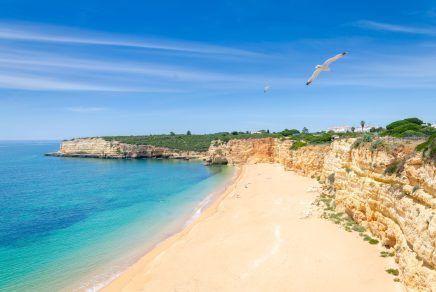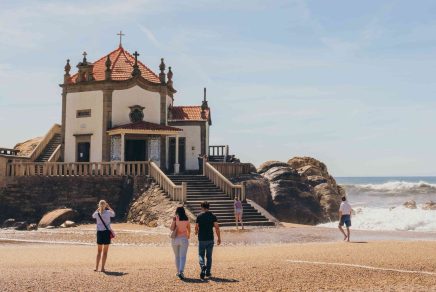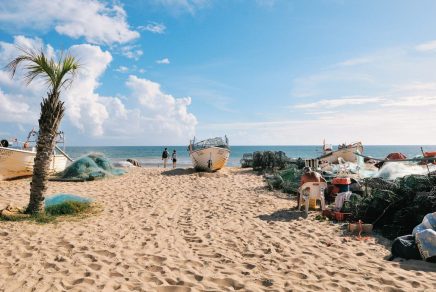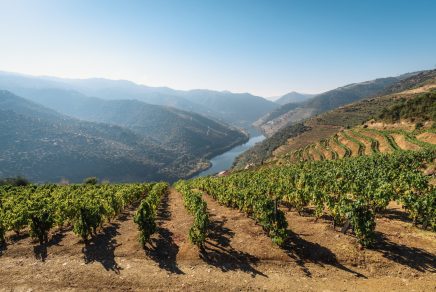Are you planning on visiting Portugal soon? To get you started, here are some films, novels, series and movies set in Portugal that feature the country’s culture at the center of their stories from James Bond’s antics to poignant historical dramas about the country’s complicated history. Enjoy!
The Very Best of Amália Rodrigues
Amália Rodrigues, affectionately known as the Queen of Fado, is an enduring icon in Portuguese music. Her legacy goes far beyond her homeland, as her powerful, emotive voice has captivated audiences worldwide, bringing the soul-stirring genre of fado to international acclaim. Fado, characterized by its deep sense of longing and melancholy, finds its most authentic expression in Rodrigues’ music. She became the face and voice of fado, embodying the genre’s rich emotional depth and cultural significance. Her songs, such as “Lisboa Antiga” and “Povo Que Lavas No Rio,” remain timeless, drawing listeners into the evocative world of Portuguese saudade.
The High Mountains of Portugal by Yann Martel
The High Mountains of Portugal is a novel that takes readers on a deeply emotional and philosophical journey across the stunning landscapes and history of Portugal. Spanning several decades, it interweaves the lives of three men—each on a quest for meaning and redemption—against the backdrop of a changing nation. The story begins in early 20th-century Lisbon, where a young man discovers a mysterious diary that sets him on a path to uncover a hidden treasure. This journey takes him through the diverse and scenic terrains of Portugal, from its sunny coastal towns to the rugged northern mountains.
Martel’s narrative is a blend of adventure, introspection, and magical realism, offering readers a profound exploration of love, loss, and the search for purpose.
Which James Bond was filmed in Portugal? On Her Majesty’s Secret Service!
In the classic 1969 James Bond film On Her Majesty’s Secret Service, Agent 007, played by George Lazenby, takes audiences on another thrilling adventure filled with high-stakes espionage. This installment is particularly memorable for its stunning Portuguese filming locations, which add an exotic flair to the film’s dramatic sequences. The opulent Estoril Palacio Hotel serves as a glamorous backdrop, as does Lisbon’s Praça Dom Pedro IV and the wild beauty of Cascais’ beautiful beaches.
The James bond film’s dramatic conclusion, filmed on a winding mountain road in the Arrábida Natural Park near Setúbal, showcases the rugged natural beauty of Portugal, making it an unforgettable chapter in the Bond saga.
The Wine Show
For wine enthusiasts and curious travelers alike, The Wine Show is a delightful exploration of the world’s most renowned wine regions, with a special focus on the historic Douro Valley in Portugal. This series, hosted by actors Dominic West and Matthew Goode, takes viewers on a scenic journey through Portugal’s rich viticultural heritage. The show delves into the unique landscapes that produce some of the world’s finest wines, highlighting the Douro Valley’s terraced vineyards and the traditional methods of winemaking that have been preserved for centuries.
Beyond the wines themselves, the series explores Portugal’s broader cultural and historical context, painting a vivid picture of a nation deeply connected to its land and traditions. The hosts’ charming camaraderie and genuine passion for wine make this show a must-watch for anyone interested in the stories behind the bottle.
Vitalina Varela
Vitalina Varela is a hauntingly beautiful film that tells the poignant story of a Cape Verdean woman who arrives in Portugal only to find that her estranged husband has passed away just days before her arrival. Directed by Pedro Costa, the film is a raw and intimate portrayal of grief, displacement, and the harsh realities faced by immigrants in Lisbon’s impoverished neighborhoods. Vitalina’s journey through the dimly lit, labyrinthine streets of Lisbon reflects her inner turmoil and the isolation she feels in a foreign land.
The film’s minimalist style, with its stark visuals and deliberate pacing, draws viewers into a deeply personal experience of loss and resilience. Vitalina Varela is more than just a film; it is a meditation on the human condition, capturing the quiet strength of a woman who must find a way to live in a world that seems indifferent to her pain.
Until Life Do Us Part
Set in the sun-drenched Algarve region, Until Life Do Us Part is a heartwarming series that explores the dynamics of family life across three generations. The story centers around a family-run wedding planning business, where the joys and challenges of love and relationships are brought to the forefront against the picturesque backdrop of southern Portugal. The idyllic villa, where the family lives and works, serves as a metaphor for the delicate balance they strive to maintain between their professional responsibilities and personal lives. As they navigate the complexities of love, marriage, and family ties, the characters reflect the broader theme of how different generations adapt to change and maintain connections in an ever-evolving world.
The series is a celebration of life’s milestones and the enduring bonds that unite us, all set within the stunning landscape of the Algarve.
Glória — a classic film about Portugal’s history
Glória is a gripping historical drama set during the tense years of the Cold War, offering a rare glimpse into a pivotal period of Portuguese history. Set in the small village of Glória do Ribatejo in the Alentejo region, the series follows João Vidal, a young engineer who becomes an unlikely spy for the KGB.
The show’s portrayal of 1960s Portugal, with its political intrigue and atmospheric settings, draws viewers into a world where the stakes are high, and trust is a rare commodity. As João navigates the dangerous waters of espionage, the series explores themes of loyalty, betrayal, and the complex nature of identity. The stunning cinematography captures both the beauty and the tension of rural Portugal, making Glória not only a thrilling spy drama but also a poignant reflection on a nation at the crossroads of history.
Night Train to Lisbon by Pascal Mercier — one of the most famous movies filmed in Portugal
Night Train to Lisbon is a philosophical thriller that takes readers on a captivating journey through the streets of Lisbon, where the past and present intertwine in mysterious ways. The novel follows Raimund Gregorius, a Swiss professor who, after a chance encounter with a Portuguese woman, abandons his routine life to unravel the secrets of a book written by a mysterious Portuguese author. His quest leads him to Lisbon, where he delves into the author’s life, uncovering a tale of resistance, love, and loss during Portugal’s Salazar dictatorship. As Gregorius navigates the city’s winding alleys, charming architecture and historic landmarks, he becomes increasingly drawn into the enigmatic world of the author, whose life mirrors the broader struggles of a nation under authoritarian rule.
For those who prefer the big screen, check out the 2013 movie adaptation featuring Jeremy Irons and Mélanie Laurent.
The Maias by Eça de Queirós
The Maias is a masterful novel by Eça de Queirós, widely regarded as one of the greatest works of Portuguese literature. Set in the late 19th century, the novel offers a sweeping critique of the social and political decay of Lisbon’s upper class, as seen through the lens of the Maia family. Over three generations, the Maias experience the rise and fall of their fortunes, with their personal dramas unfolding against the backdrop of a society in decline. Lisbon itself is a central character in the novel, its opulent palaces and lush gardens reflecting both the grandeur and the decadence of the era.
Through his sharp and often satirical prose, Queirós paints a vivid portrait of a society trapped in the past, unable to adapt to the modern world. The Maias is a compelling exploration of the intersection between personal and societal change, and the inevitable consequences of a world resistant to progress.
The Domain
In The Domain (A Herdade), director Tiago Guedes presents a sweeping saga that delves into the complex history of Portugal from the mid-20th century to the present day. The film tells the story of João Fernandes, the patriarch of a wealthy landowning family, whose vast estate in the Ribatejo region becomes a microcosm of the country’s broader social and political changes in the midst of the linked to the Carnation Revolution of 1974. As the family navigates the turbulent years of dictatorship, and the transition to democracy, the estate stands as a symbol of both continuity and change.
The film’s stunning cinematography captures the beauty of the Portuguese landscape, while its intricate narrative explores themes of power, legacy, and the impact of historical events on personal lives. The Domain is a powerful reflection on the ways in which history shapes and is shaped by the people who live it.
Eugene Levy, The Reluctant Traveler
In The Reluctant Traveler, Canadian actor and comedian Eugene Levy takes viewers on a humorous yet insightful journey through some of the world’s most luxurious locations. One episode is dedicated to Lisbon, where Levy, known for his skeptical and often reluctant approach to travel, finds himself charmed by the city’s rich history, vibrant culture, and stunning architecture. From the grandeur of Lisbon’s historic palaces to the cozy charm of its traditional cafés, Levy’s experiences highlight the contrasts and surprises that make the city so unique. His encounters with locals and his candid reflections on travel offer a fresh perspective on Lisbon, making the episode both entertaining and enlightening.
The Reluctant Traveler is a reminder of the joys and challenges of stepping out of one’s comfort zone and discovering the world with an open mind.
Capitães de Abril
Famous screenwriter Maria de Medeiros brings the Carnation Revolution to life in this powerful 2000 film that captures a pivotal moment in Portuguese democracy: the peaceful overthrow of Europe’s longest-standing dictatorship on April 25, 1974.
Capitães de Abril masterfully weaves together personal stories with historical events, particularly highlighting the role of Captain Salgueiro Maia, whose leadership proved instrumental in changing Portugal’s future. Through intimate portrayals and authentic period details, viewers experience the tension and hope of those transformative 24 hours.
Baltasar and Blimunda by José Saramago
José Saramago’s Baltasar and Blimunda is a richly textured historical novel that transports readers to 18th-century Portugal, during the construction of the magnificent Mafra Convent. The story follows Baltasar, a one-handed ex-soldier, and Blimunda, a woman with the extraordinary ability to see inside people’s souls. Their love story unfolds against the backdrop of a society marked by religious fervor, political intrigue, and scientific curiosity. Together with Father Bartolomeu Lourenço, a visionary priest, they embark on an ambitious project to build a flying machine, symbolizing the human desire for freedom and transcendence. Saramago’s lyrical prose and deep exploration of themes such as love, faith, and the tension between tradition and innovation make Baltasar and Blimunda a timeless tale of passion and perseverance.
The novel not only captures the spirit of an era but also offers a profound meditation on the enduring quest for human connection and understanding.
The Ninth Gate — what movie is set in Sintra, Portugal?
The Ninth Gate, a 1999 mystery thriller features scenes set in the enchanting town of Sintra, Portugal. Known for its mystical landscapes and historic palaces, Sintra provides a perfect backdrop for the film’s eerie and enigmatic atmosphere. In the movie, Johnny Depp plays a rare book dealer, Dean Corso, who is hired to authenticate a book that supposedly holds the key to summoning the devil. As Corso’s journey leads him to various locations across Europe, the surreal and atmospheric setting of Sintra, with its foggy forests and ancient architecture, heightens the film’s dark and mysterious tone.








